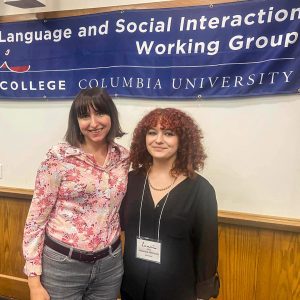
Ordinary conversations provided a riveting research opportunity for Alexandra Milchovich, a junior majoring in communication and rhetorical studies (CRS) and English.
Studying the function and impact of queer media references in conversation, Milchovich recently presented her research at the annual meeting of the Language and Social Interaction Working Group (LANSI) at Columbia University’s Teachers College. LANSI brings together scholars and students working on naturally occurring data within the broad area of language and social interaction.
Milchovich’s project emerged out of an assignment for Intercultural Communication (CRS 430), a class taught by CRS Associate Professor Sylvia Sierra. While transcribing a recorded conversation for class, Milchovich noticed multiple queer media references.
These references take various forms, such as a group of friends singing the songs of Sophie, a transgender artist and producer. For those identifying as queer, the references serve a purpose.
“When we’re making these references, we’re constructing our identities as queer and placing ourselves in this in-group that we all understand,” Milchovich says.
Referencing queer media helps establish solidarity, create queer joy, and celebrate queer identities, her research revealed.
When Milchovich presented her initial findings in class, Sierra began talking with her about submitting to LANSI. The project was further developed, and Sierra was impressed with the final product.
“Alex worked very hard on preparing her conference talk, and her hard work really showed,” Sierra says. “Her talk was flawless.”
At the conference, Milchovich received invaluable feedback. She even gained insights from one of her academic heroes, Mary Bucholtz, a faculty member at the University of California, Santa Barbara, who was an invited speaker.
The experience broadened her perspective and introduced her to other potential aspects of her research, such as generational components. She encourages fellow undergraduates to take advantage of every opportunity to conduct their own research and get it into the public.
“Milk all the opportunities you have, especially when it comes to conference presentations,” she says. “It’s going to better your research and enrich your life.”
Milchovich hopes her work, which is funded in part by a SOURCE Bridge Award, will fill existing research gaps. She and Sierra plan to summarize their findings in a paper sometime in 2025.
